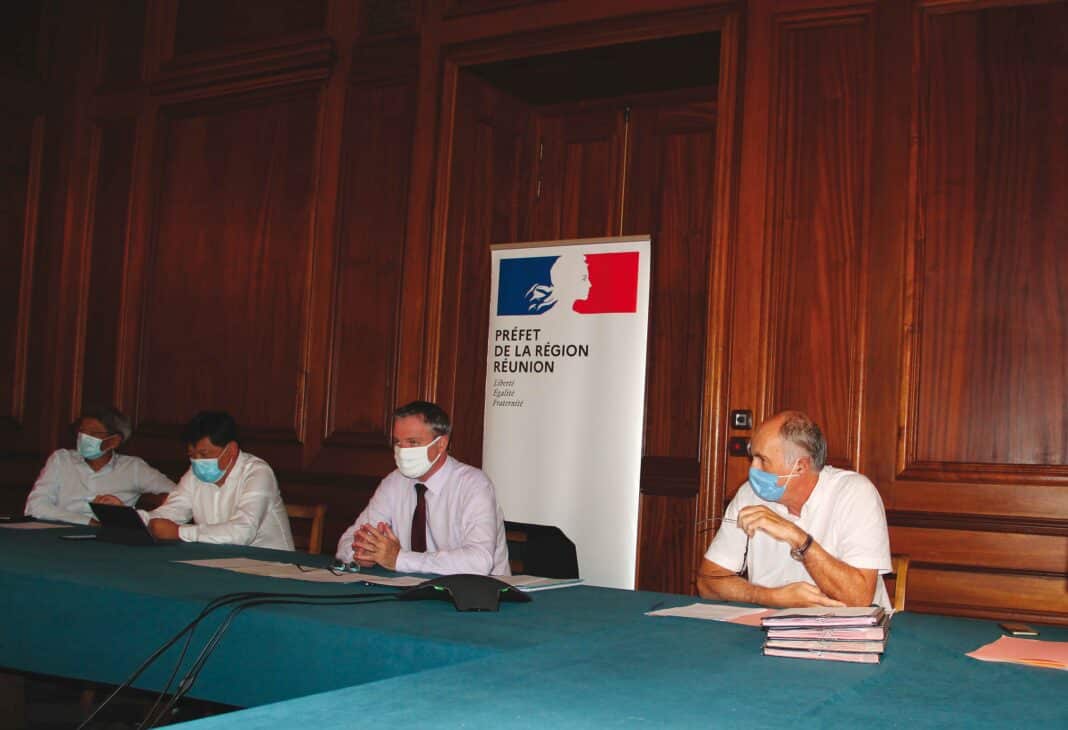On February 16, ADIR signed a charter of commitment with local distribution brands to support the creation of value through the development of local production in food distribution.. The initiative aims to promote dialogue between major retail players and local suppliers..
This signing was done under the aegis and in the presence of the prefect of Reunion, of the presidents of the regional and departmental councils and with the approval of the inter-professions of the primary sector. This charter, adopted for a period of two years, aims to develop the presence and visibility of local production in mass distribution in Reunion Island. The signatories undertake to implement a whole series of actions to promote and develop local production, better display local products, but also provide a response to the expectations of Reunion consumers in terms of price and diversity of offer. This will require producers to invest in productivity, product quality in terms of food safety and product traceability. Also highlighted are the subject of employment and the pride of a territory in producing and consuming what it produces..
Upscaling and visibility of the local offer
The Charter plans to adapt production “to take into account in an optimized manner market expectations (product offering, quality, security, prix, volumes) in compliance with the distribution constraints specific to the Reunion area, including the implementation (…) actions aimed at improving and upgrading the food offering and, more generally, the offering of FMCG products. » Manufacturers thus undertake to “offer, for any imported product, an alternative to the consumer by referencing an equivalent local offer”. To strengthen the visibility of local production, it is planned to “establish an identification of local production (markup, price tag adapted to consumer demand, communication and commercial operations of brands, financial support, etc.) through brands like Nou la Fé (…) ». Visibility will be based on “a policy of promoting local brands and products supported, both in terms of the number of products selected, their presence in catalogs and their promotion in stores (…) »
Promotion, innovation, export
On the question of promotions, mass retail brands undertake to “ensure a responsible promotional and margin policy with regard to local production to enable its development”. They are also committed to supporting innovation “through a referencing and exhibition policy favorable to innovative products of local production”, as well as supporting exports through “active support of local production approaches, towards their partners, parent company or subsidiaries in mainland France, in other overseas departments or any other foreign country. »
Monitoring indicators
Large retail brands are asked to “define individually and independently a marketing plan allowing the implementation of these commitments”. The Charter recalls in this respect that “each manufacturer remains totally independent and free in the context of commercial negotiations with its customers/distributors”. Another proposal from the Charter : the definition and implementation of “macro-economic and business indicators of the weight of local production” in the mass distribution offer. “These indicators could carry, notably, on the number of references, le facing, presence in promotions, of local production. » The Charter thus provides for the creation of an “Indicators” working group which will include among its members an “independent third party”, guarantor of the neutrality of the practical methods of determining and applying indicators.
“It’s about initiating a virtuous circle”
Sales and Marketing Director of the Chatel group, Julie Chatel is in charge of monitoring the Charter within ADIR.
What has happened since the signing of the Charter, February 16 ?
We are making progress in setting up the “Indicators” group. The choice of “independent third party” is under study. The independent third party must not be part of either industry or mass distribution. We have approached several candidates. We are awaiting validation from the signatory parties to the Charter. We are also working on defining the list of local products. ADIR et, wider, local industry are not the only ones affected by the Charter. This applies to all local production. One of the essential points to clarify, it is therefore to define what a local product is, to be able to establish the list of local products. We work with the different inter-professional organizations to compose this list.
Large distribution and local production have always worked together. Why this need to formalize your relationships today ?
That's right, there has always been close collaboration between local production and mass distribution. Recent crises have highlighted issues that underline the importance of this collaboration and the need to consolidate it.. The yellow vest crisis has expressed the issue of local purchasing power. We have been working side by side since, producers and brands, to find solutions to this problem, which involves in particular increasing the productivity of local industrial companies. Then came the health crisis with confinement which reminded us of the issue, for the meeting, to have strong local production, diverse and responsive. Faced with these challenges, mass distribution demonstrates its desire to mobilize alongside us via the Charter. We adopt a method to be able to work better together. For that, we need to evaluate the concrete effects of this collaboration. This will be the function of the indicators.
Local industry undertakes through this Charter to offer the alternative of a local product for each imported product.. Is it possible ?
We can always do more, but we will never be able to replace all imports. The idea, it's that, when an imported product represents a significant market, local production is able to position itself on this market with a product of at least the same quality. More, to achieve this, local production needs mass distribution. It’s about initiating a virtuous circle that will benefit everyone..













